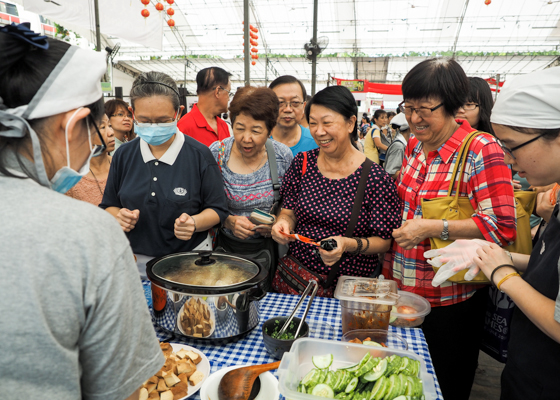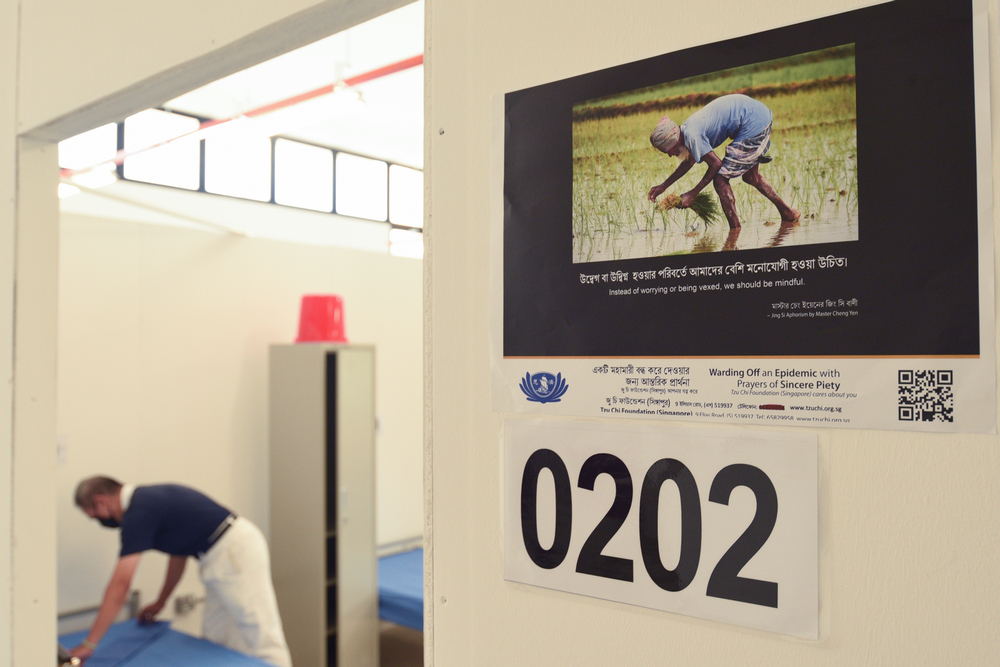
The second Commissioner Training Course for this year has as its main theme, “Tzu Chi Humanistic Medical Care”, and TIMA medical personnel and medical volunteers seized the opportunity to present a song through sign language to the audience.
It was the morning of June 29, 2014, and the clear blue sky outside Jing Si Hall heralded the fine weather ahead. This day was the second Commissioner Training by Tzu Chi Foundation (Singapore), and a total of 67 members participated in this training course which had as its central theme, “Tzu Chi Humanistic Medical Care.”
In addition to viewing a recent teaching of Dharma Master Cheng Yen entitled “Essence of the Bodhi Mind—Remaining Ever Mindful, Never Retreating” Tzu Chi Singapore Deputy CEO Mr. Kenny Khoo, a long-serving medical volunteer with deep convictions, was also invited to share on the beginnings of Tzu Chi’s medical mission as well as highlighting the current workings of the medical arm of Tzu Chi Singapore.
The training group also specially invited resident doctor of the Tzu Chi Free Health Screening and Medical Clinic Dr Edwin Lim Boon Howe, as well as Singapore TIMA members Dr Eugene Tang Kok Weng and Assoc. Prof. Ng Yee Kong to share their valuable experience. This is the first time that medical doctors took on the role of being lecturers in the Commissioner Training Course, joining hands with the community volunteers in learning to progress together.
Actualizing and Attesting to the Wisdom of Jing Si Aphorisms
Tzu Chi Free Health Screening and Medical Clinic resident doctor Dr Edwin Lim combined the use of Jing Si Aphorisms with personal anecdotes, and even overcame the challenge of his English-educated background to share in Mandarin, the touching cases he encountered in his daily work. Another TIMA doctor Dr Ho Eu Chin shared his volunteering experience during the Philippines Medical Mission in April 2014, and though his sharing was in English, he vowed to learn Mandarin so that he would be able to experience a deeper understanding of the beauty of Tzu Chi’s missions.
Other than sharing on his recent experiences at the post Typhoon Haiyan Medical Mission in Tacloban, Philippines, he also took part in a dental conference in Manila, which preceded the medical mission.
Learning and applying the Jing Si Aphorisms in his daily life, Dr Eugene Tang humorously quoted the different aphorisms to bring his talk alive; for example, he used the aphorism “Only with feet firmly planted on the ground can one enjoy stability and peace” to emphasize the importance of implant stability in contributing to the success of implant healing. He alluded to the importance of preventive medicine through another aphorism: “Be prepared for crisis even when all is well, so that we won’t end up wishing in vain for safety when danger befalls”. Despite being a Christian himself, Dr Eugene Tang played the song “Life After Life on the Path of Enlightenment” on a bamboo flute right after his sharing to encourage others on in their path of cultivation.
Effecting Change Through Humanistic Medical Practices
Assoc. Prof. Ng Yee Kong teaches Human Anatomy at the National University of Singapore ( NUS) School of Medicine and participated in the 2008 International TIMA Conference in Hualien, Taiwan. It was at the TIMA Conference that he developed tremendous admiration and deep gratitude for the concept of the “ Silent Mentor.” Henceforth, Professor Ng made a vow to Master Cheng Yan that he would promote this form of medical humanity to the National University of Singapore’s School of Medicine.
Every task has a difficult beginning. NUS is a secular tertiary institution and the school also has students and professors of different races and religious backgrounds, so it is no small challenge to try and introduce the concept of the "Silent Mentor" and the philosophy of showing respect and gratitude to body donors. However that did not deter Professor Ng from realizing his vow; he had his feet firmly planted on the ground and carried out his plan step by step, by first inviting the professors from the School of Medicine to visit Tzu Chi University’s School of Medicine to gain a firsthand experience and understanding of the general surgical simulation course. Since 2011, different groups of NUS medical students have attended the Tzu Chi University surgical simulation program.
Soon, part of the mandatory anatomy dissection course content started to include the humane treatment of a “Silent Mentor.” Professor Ng also actively contributed to the signing of a Memorandum of Understanding and Cooperation* between the two schools of medicine, thus enabling the continued participation by NUS medical students in the Silent Mentor program at Tzu Chi Hospital. After much hard work and mutual co-operation, NUS’s medical school now exhibits a visible change in attitude towards the Silent Mentor program.
As early as a decade ago, Singapore medical students learnt gross anatomy from cadavers that were largely unclaimed bodies. Between the years 2000-2012, NUS School of Medicine did not receive any donated bodies, but after general announcements by the relevant authorities in 2012, members of the public began to recognize and identify with the body donation program, and to date, NUS has already received 11 silent mentors through the donation program.
Tzu Chi respectfully termed the silent “teachers” the "Silent Mentors," and NUS School of Medicine has also set up a commemorative plaque for the Silent Mentors to commemorate their act of selfless dedication. At the end of the course, medical students also organize a thanksgiving ceremony and pen their gratitude to the Silent Mentors and their families to show their deep appreciation.
Through this half-day Commissioner Training Course, the attendees not only enhanced their understanding of Tzu Chi’s Mission of Medicine, but have also come to realize the benefits of Tzu Chi’s humanistic medical care on society at large.

A product of an English educational background, Dr. Edwin Lim entrusted someone to translate his prepared English script to Chinese and added on Hanyu Pinyin as a transliteration guide. Dr. Edwin spoke completely in Mandarin, sharing his experiences and touching stories with his audience, an exemplary example of someone who has persisted despite difficulties.
 Having participated in many medical missions over the years, Dr Eugene Tang not only shared about his personal experiences in medical missions, but also inspired and encouraged the attendees by performing the song “Life After Life on the Path of Enlightenment” on his flute.
Having participated in many medical missions over the years, Dr Eugene Tang not only shared about his personal experiences in medical missions, but also inspired and encouraged the attendees by performing the song “Life After Life on the Path of Enlightenment” on his flute.

Dr Ho Eu Chin is relatively new to the Tzu Chi Medical Association. He joined TIMA and participated in the April 2014 post Typhoon Haiyan Medical Mission in Tacloban, Philippines. He shared that we must be deeply aware of the need to be grateful because we enjoy peace and prosperity in Singapore.

Human Anatomy lecturer Assoc. Prof. Ng Yee Kong shared how he felt profound admiration and deep gratitude when he was introduced the “Silent Mentor” program during the 2008 Annual TIMA Conference in Taiwan. He subsequently introduced the Silent Mentor program to Singapore.


